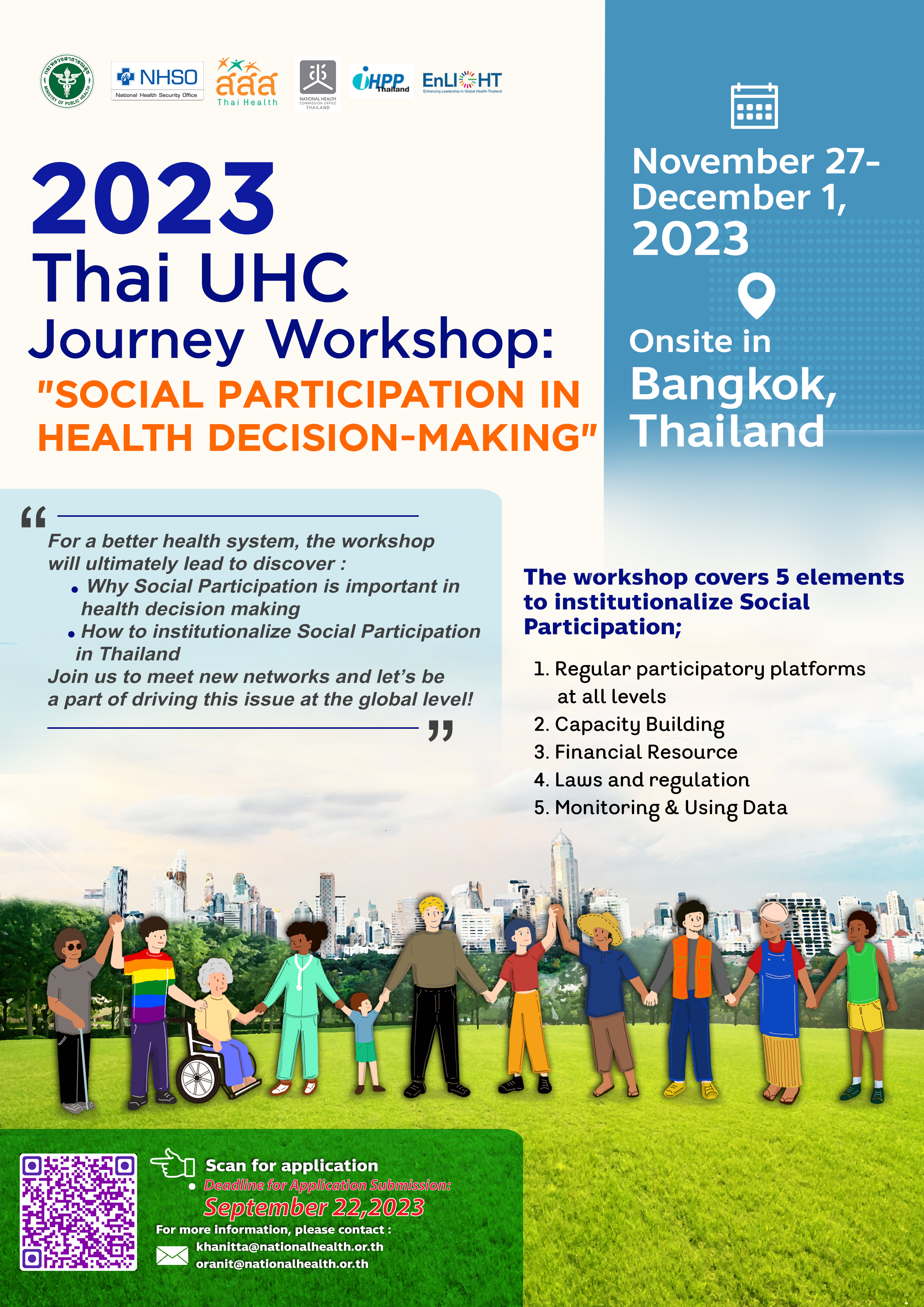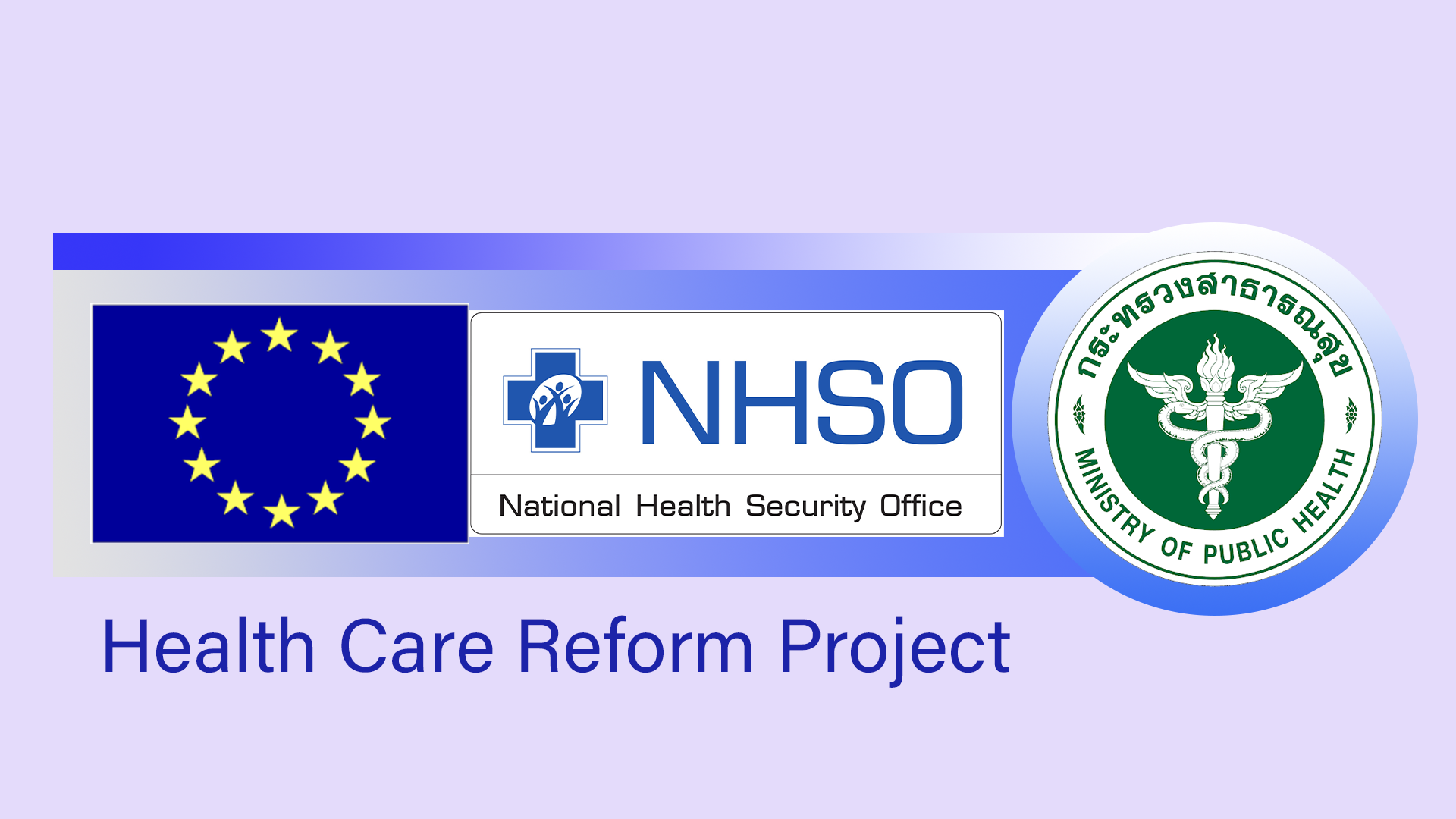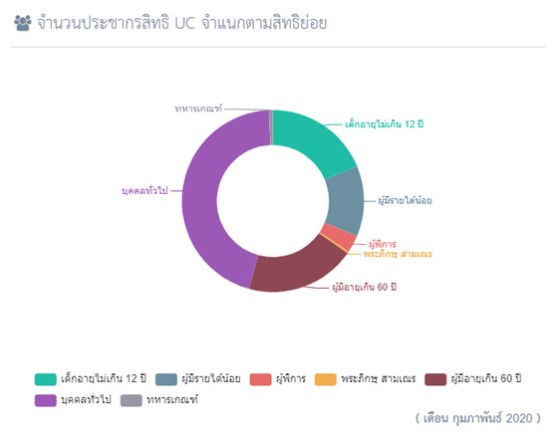South Africa praises NHSO's health financing model
South Africa praises NHSO's health financing model.

With nearly 57 million populations, South Africa has pledged to move closer to UHC and set a goal to introduce its first National Health Insurance (NHI) by 2026. Its government has currently drafted the NHI bill and placed it in public hearings.
With the country's progress toward UHC, around 10 delegates from South Africa visited the National Health Security Office (NHSO) on Monday (3 Feb) to learn about the operation of UHC in Thailand.
“We’re here because we want to study the Thai healthcare system and how UHC is implemented specifically through the NHSO,” said Aquina Thulare, a delegate and a technical advisor on NHI in Minister of Health.
“We look at Thailand because Thailand and South Africa are very close in terms of economic position and development progress. We both are not very rich countries. We are upper-middle-income countries, though there’s high poverty in South Africa.”
She added that her country will need an organization equivalent to NHSO to achieve health financing reform. It will also need reforms in other areas especially having an improvement in tax collection to increase the government’s revenue. Some other components needed to be addressed---including quality of healthcare services, better infrastructure, increasing information access and research units.
Madoda Sambatha, leader of delegates and Member of Executive Council for Health in the northwest provinces, said that though the introduction of the NHI scheme had been committed by the government, the private providers had opposed it.
“Because the scheme would make health services free of charge,” he said.
Private sector is a major player in South Africa's healthcare system. It employs 69% of skilled medical staff, but mainly serves out-of-pocket payment and patients under private insurances.
South Africa will inevitably need to engage private sector in NHI scheme to ensure that no one is left behind," said Sambatha.
He added that there’s the need to improve transparency as the corruption level is high in the country.
“The most important thing in achieving UHC is political will. Once you have the political will, it may not be difficult to develop strategies, build up financial capacity and allocate resources,” said Sambath.
////////////3 February 2020

With nearly 57 million populations, South Africa has pledged to move closer to UHC and set a goal to introduce its first National Health Insurance (NHI) by 2026. Its government has currently drafted the NHI bill and placed it in public hearings.
With the country's progress toward UHC, around 10 delegates from South Africa visited the National Health Security Office (NHSO) on Monday (3 Feb) to learn about the operation of UHC in Thailand.
“We’re here because we want to study the Thai healthcare system and how UHC is implemented specifically through the NHSO,” said Aquina Thulare, a delegate and a technical advisor on NHI in Minister of Health.
“We look at Thailand because Thailand and South Africa are very close in terms of economic position and development progress. We both are not very rich countries. We are upper-middle-income countries, though there’s high poverty in South Africa.”
She added that her country will need an organization equivalent to NHSO to achieve health financing reform. It will also need reforms in other areas especially having an improvement in tax collection to increase the government’s revenue. Some other components needed to be addressed---including quality of healthcare services, better infrastructure, increasing information access and research units.
Madoda Sambatha, leader of delegates and Member of Executive Council for Health in the northwest provinces, said that though the introduction of the NHI scheme had been committed by the government, the private providers had opposed it.
“Because the scheme would make health services free of charge,” he said.
Private sector is a major player in South Africa's healthcare system. It employs 69% of skilled medical staff, but mainly serves out-of-pocket payment and patients under private insurances.
South Africa will inevitably need to engage private sector in NHI scheme to ensure that no one is left behind," said Sambatha.
He added that there’s the need to improve transparency as the corruption level is high in the country.
“The most important thing in achieving UHC is political will. Once you have the political will, it may not be difficult to develop strategies, build up financial capacity and allocate resources,” said Sambath.
////////////3 February 2020
IN DEPTH
South Africa praises NHSO's health financing model
South Africa praises NHSO's health financing model.

With nearly 57 million populations, South Africa has pledged to move closer to UHC and set a goal to introduce its first National Health Insurance (NHI) by 2026. Its government has currently drafted the NHI bill and placed it in public hearings.
With the country's progress toward UHC, around 10 delegates from South Africa visited the National Health Security Office (NHSO) on Monday (3 Feb) to learn about the operation of UHC in Thailand.
“We’re here because we want to study the Thai healthcare system and how UHC is implemented specifically through the NHSO,” said Aquina Thulare, a delegate and a technical advisor on NHI in Minister of Health.
“We look at Thailand because Thailand and South Africa are very close in terms of economic position and development progress. We both are not very rich countries. We are upper-middle-income countries, though there’s high poverty in South Africa.”
She added that her country will need an organization equivalent to NHSO to achieve health financing reform. It will also need reforms in other areas especially having an improvement in tax collection to increase the government’s revenue. Some other components needed to be addressed---including quality of healthcare services, better infrastructure, increasing information access and research units.
Madoda Sambatha, leader of delegates and Member of Executive Council for Health in the northwest provinces, said that though the introduction of the NHI scheme had been committed by the government, the private providers had opposed it.
“Because the scheme would make health services free of charge,” he said.
Private sector is a major player in South Africa's healthcare system. It employs 69% of skilled medical staff, but mainly serves out-of-pocket payment and patients under private insurances.
South Africa will inevitably need to engage private sector in NHI scheme to ensure that no one is left behind," said Sambatha.
He added that there’s the need to improve transparency as the corruption level is high in the country.
“The most important thing in achieving UHC is political will. Once you have the political will, it may not be difficult to develop strategies, build up financial capacity and allocate resources,” said Sambath.
////////////3 February 2020

With nearly 57 million populations, South Africa has pledged to move closer to UHC and set a goal to introduce its first National Health Insurance (NHI) by 2026. Its government has currently drafted the NHI bill and placed it in public hearings.
With the country's progress toward UHC, around 10 delegates from South Africa visited the National Health Security Office (NHSO) on Monday (3 Feb) to learn about the operation of UHC in Thailand.
“We’re here because we want to study the Thai healthcare system and how UHC is implemented specifically through the NHSO,” said Aquina Thulare, a delegate and a technical advisor on NHI in Minister of Health.
“We look at Thailand because Thailand and South Africa are very close in terms of economic position and development progress. We both are not very rich countries. We are upper-middle-income countries, though there’s high poverty in South Africa.”
She added that her country will need an organization equivalent to NHSO to achieve health financing reform. It will also need reforms in other areas especially having an improvement in tax collection to increase the government’s revenue. Some other components needed to be addressed---including quality of healthcare services, better infrastructure, increasing information access and research units.
Madoda Sambatha, leader of delegates and Member of Executive Council for Health in the northwest provinces, said that though the introduction of the NHI scheme had been committed by the government, the private providers had opposed it.
“Because the scheme would make health services free of charge,” he said.
Private sector is a major player in South Africa's healthcare system. It employs 69% of skilled medical staff, but mainly serves out-of-pocket payment and patients under private insurances.
South Africa will inevitably need to engage private sector in NHI scheme to ensure that no one is left behind," said Sambatha.
He added that there’s the need to improve transparency as the corruption level is high in the country.
“The most important thing in achieving UHC is political will. Once you have the political will, it may not be difficult to develop strategies, build up financial capacity and allocate resources,” said Sambath.
////////////3 February 2020
Events
South Africa praises NHSO's health financing model
South Africa praises NHSO's health financing model.

With nearly 57 million populations, South Africa has pledged to move closer to UHC and set a goal to introduce its first National Health Insurance (NHI) by 2026. Its government has currently drafted the NHI bill and placed it in public hearings.
With the country's progress toward UHC, around 10 delegates from South Africa visited the National Health Security Office (NHSO) on Monday (3 Feb) to learn about the operation of UHC in Thailand.
“We’re here because we want to study the Thai healthcare system and how UHC is implemented specifically through the NHSO,” said Aquina Thulare, a delegate and a technical advisor on NHI in Minister of Health.
“We look at Thailand because Thailand and South Africa are very close in terms of economic position and development progress. We both are not very rich countries. We are upper-middle-income countries, though there’s high poverty in South Africa.”
She added that her country will need an organization equivalent to NHSO to achieve health financing reform. It will also need reforms in other areas especially having an improvement in tax collection to increase the government’s revenue. Some other components needed to be addressed---including quality of healthcare services, better infrastructure, increasing information access and research units.
Madoda Sambatha, leader of delegates and Member of Executive Council for Health in the northwest provinces, said that though the introduction of the NHI scheme had been committed by the government, the private providers had opposed it.
“Because the scheme would make health services free of charge,” he said.
Private sector is a major player in South Africa's healthcare system. It employs 69% of skilled medical staff, but mainly serves out-of-pocket payment and patients under private insurances.
South Africa will inevitably need to engage private sector in NHI scheme to ensure that no one is left behind," said Sambatha.
He added that there’s the need to improve transparency as the corruption level is high in the country.
“The most important thing in achieving UHC is political will. Once you have the political will, it may not be difficult to develop strategies, build up financial capacity and allocate resources,” said Sambath.
////////////3 February 2020

With nearly 57 million populations, South Africa has pledged to move closer to UHC and set a goal to introduce its first National Health Insurance (NHI) by 2026. Its government has currently drafted the NHI bill and placed it in public hearings.
With the country's progress toward UHC, around 10 delegates from South Africa visited the National Health Security Office (NHSO) on Monday (3 Feb) to learn about the operation of UHC in Thailand.
“We’re here because we want to study the Thai healthcare system and how UHC is implemented specifically through the NHSO,” said Aquina Thulare, a delegate and a technical advisor on NHI in Minister of Health.
“We look at Thailand because Thailand and South Africa are very close in terms of economic position and development progress. We both are not very rich countries. We are upper-middle-income countries, though there’s high poverty in South Africa.”
She added that her country will need an organization equivalent to NHSO to achieve health financing reform. It will also need reforms in other areas especially having an improvement in tax collection to increase the government’s revenue. Some other components needed to be addressed---including quality of healthcare services, better infrastructure, increasing information access and research units.
Madoda Sambatha, leader of delegates and Member of Executive Council for Health in the northwest provinces, said that though the introduction of the NHI scheme had been committed by the government, the private providers had opposed it.
“Because the scheme would make health services free of charge,” he said.
Private sector is a major player in South Africa's healthcare system. It employs 69% of skilled medical staff, but mainly serves out-of-pocket payment and patients under private insurances.
South Africa will inevitably need to engage private sector in NHI scheme to ensure that no one is left behind," said Sambatha.
He added that there’s the need to improve transparency as the corruption level is high in the country.
“The most important thing in achieving UHC is political will. Once you have the political will, it may not be difficult to develop strategies, build up financial capacity and allocate resources,” said Sambath.
////////////3 February 2020
RESOURCE CENTER
SECRETARY-GENERAL
South Africa praises NHSO's health financing model
South Africa praises NHSO's health financing model.

With nearly 57 million populations, South Africa has pledged to move closer to UHC and set a goal to introduce its first National Health Insurance (NHI) by 2026. Its government has currently drafted the NHI bill and placed it in public hearings.
With the country's progress toward UHC, around 10 delegates from South Africa visited the National Health Security Office (NHSO) on Monday (3 Feb) to learn about the operation of UHC in Thailand.
“We’re here because we want to study the Thai healthcare system and how UHC is implemented specifically through the NHSO,” said Aquina Thulare, a delegate and a technical advisor on NHI in Minister of Health.
“We look at Thailand because Thailand and South Africa are very close in terms of economic position and development progress. We both are not very rich countries. We are upper-middle-income countries, though there’s high poverty in South Africa.”
She added that her country will need an organization equivalent to NHSO to achieve health financing reform. It will also need reforms in other areas especially having an improvement in tax collection to increase the government’s revenue. Some other components needed to be addressed---including quality of healthcare services, better infrastructure, increasing information access and research units.
Madoda Sambatha, leader of delegates and Member of Executive Council for Health in the northwest provinces, said that though the introduction of the NHI scheme had been committed by the government, the private providers had opposed it.
“Because the scheme would make health services free of charge,” he said.
Private sector is a major player in South Africa's healthcare system. It employs 69% of skilled medical staff, but mainly serves out-of-pocket payment and patients under private insurances.
South Africa will inevitably need to engage private sector in NHI scheme to ensure that no one is left behind," said Sambatha.
He added that there’s the need to improve transparency as the corruption level is high in the country.
“The most important thing in achieving UHC is political will. Once you have the political will, it may not be difficult to develop strategies, build up financial capacity and allocate resources,” said Sambath.
////////////3 February 2020

With nearly 57 million populations, South Africa has pledged to move closer to UHC and set a goal to introduce its first National Health Insurance (NHI) by 2026. Its government has currently drafted the NHI bill and placed it in public hearings.
With the country's progress toward UHC, around 10 delegates from South Africa visited the National Health Security Office (NHSO) on Monday (3 Feb) to learn about the operation of UHC in Thailand.
“We’re here because we want to study the Thai healthcare system and how UHC is implemented specifically through the NHSO,” said Aquina Thulare, a delegate and a technical advisor on NHI in Minister of Health.
“We look at Thailand because Thailand and South Africa are very close in terms of economic position and development progress. We both are not very rich countries. We are upper-middle-income countries, though there’s high poverty in South Africa.”
She added that her country will need an organization equivalent to NHSO to achieve health financing reform. It will also need reforms in other areas especially having an improvement in tax collection to increase the government’s revenue. Some other components needed to be addressed---including quality of healthcare services, better infrastructure, increasing information access and research units.
Madoda Sambatha, leader of delegates and Member of Executive Council for Health in the northwest provinces, said that though the introduction of the NHI scheme had been committed by the government, the private providers had opposed it.
“Because the scheme would make health services free of charge,” he said.
Private sector is a major player in South Africa's healthcare system. It employs 69% of skilled medical staff, but mainly serves out-of-pocket payment and patients under private insurances.
South Africa will inevitably need to engage private sector in NHI scheme to ensure that no one is left behind," said Sambatha.
He added that there’s the need to improve transparency as the corruption level is high in the country.
“The most important thing in achieving UHC is political will. Once you have the political will, it may not be difficult to develop strategies, build up financial capacity and allocate resources,” said Sambath.
////////////3 February 2020
VIDEOS
Thailand's UHC Journey
UHC Public relations



















